Bracket Reset Controversy: Impacts on College Football and State Reactions
Updated On: November 13, 2025 by Aaron Connolly
Defining the Bracket Reset Controversy
The bracket reset controversy boils down to a single question: should tournaments reset grand finals if the lower bracket team manages to beat the upper bracket team? This question splits the esports world. Some folks argue for competitive fairness, while others lean toward entertainment value.
Meaning of Bracket Reset in Sports
A bracket reset happens when the lower bracket team beats the upper bracket winners in grand finals. Suddenly, the tournament bracket resets, and both teams play a second grand final match.
This system pops up because of double elimination rules. Every team gets two chances before they’re out. The upper bracket team only loses once by the time they reach the grand finals.
Here’s the basic idea:
- Lower bracket team wins first grand final = bracket resets
- Both teams play again, now on equal footing
- Winner of the second match takes home the trophy
Games like Street Fighter and Super Smash Bros use bracket resets all the time. The setup makes sure a team has to lose twice before they’re out.
If you skip bracket resets, upper bracket teams lose their hard-earned advantage. They made it that far without dropping a match, after all.
Differentiating Regular and Reset Brackets
Regular brackets stick with standard double elimination, no resets. The grand final is just one showdown between the last two teams.
Regular bracket:
- Single grand final match
- Upper bracket team keeps perks like map bans or side choice
- Tournament wraps up after one series
Reset bracket:
- Could be two grand final matches
- Both teams get a real shot at double elimination
- Tournament might run longer
Valorant and CS2 usually skip resets, giving upper bracket teams things like extra map bans instead.
Rocket League tournaments often go for bracket resets. The short matches make it doable.
The big difference? It’s fairness versus practicality. Reset brackets focus on competitive integrity, while regular brackets keep things on schedule and maybe more exciting for viewers.
Controversy Origins
This whole mess started because tournament organizers and players want different things. Players want true double elimination and fairness.
Organizers worry about time. Two best-of-five series can drag on for hours. Venues close, broadcasts end, and everyone gets tired.
Why people support bracket resets:
- Keeps things fair
- Teams get two real chances
- Rewards consistency
Why people push back:
- Scheduling gets rough
- Viewers get tired of endless rematches
- If the same team wins both, it can feel anticlimactic
Broadcasting piles on more trouble. TV networks don’t love surprises that run late.
James Connolly put it pretty well: “The bracket reset debate really highlights the tension between pure competition and entertainment value in modern esports.”
Different games have landed on different answers. That sparks a lot of arguing every time someone brings up tournament formats across esports.
How the Controversy Unfolded in College Football
The bracket reset controversy blew up during a crucial College Football Playoff game. Some late-game decisions split teams, fans, and officials over tournament structure and fairness.
The Oregon vs Ohio State Incident
Oregon’s journey through the new 12-team College Football Playoff stirred up a lot of anger. As the top seed, Oregon got what many saw as a favorable spot in the bracket.
Ohio State fans argued their team got a rougher path. The seeding put Oregon on what critics called the “easier side” of the bracket.
Big Complaints:
- Unbalanced bracket
- Seeding methods under fire
- Geographic perks for some teams
- Strength of schedule all over the place
People really started questioning the selection committee’s rankings. Did the system reward the best teams or just follow a broken formula?
Ohio state reps even filed formal complaints about the bracket. They said their team earned better placement based on regular season results.
Critical Late-Game Decision
Then, in the semifinal, a call from the officials changed everything. They made a decision that directly shaped how the bracket played out and raised questions about tournament integrity.
With less than two minutes left, a penalty wiped out what looked like a game-winning play.
TV replays couldn’t settle what really happened. Social media lit up with accusations of bias and bad officiating.
How it went down:
- Play called as a score
- Officials checked the footage
- Penalty called, touchdown gone
- Other team got the ball
- The game’s outcome flipped
That ruling knocked out the higher-seeded team. Fans felt like it broke the bracket’s whole purpose.
Analysts quickly started asking if these kinds of late calls should trigger bracket resets. If so, that would totally change how tournaments work.
Immediate Reactions from Teams
Oregon’s coaches didn’t say much at first, but inside sources said they were frustrated.
Ohio State’s side didn’t hold back. Coach Ryan Day called it “unprecedented” and demanded the rules get clarified.
Team Responses:
- Oregon: Asked for a private meeting with officials
- Ohio State: Issued a public statement slamming the process
- Alabama: Supported calls for changing the bracket, even though they were out
- Georgia: Stayed neutral but said they’d back rule changes
Athletic directors from both schools reached out to the Playoff committee. They wanted emergency talks.
Players jumped on social media, questioning whether they could trust the playoff system at all.
Some teams even threatened to skip future tournaments if things didn’t change. That forced college football leaders to pay attention.
Conference commissioners quickly started talks about how bracket reset rules should work. The whole thing exposed some big problems with the expanded playoff format.
Rulebook Analysis and Loopholes
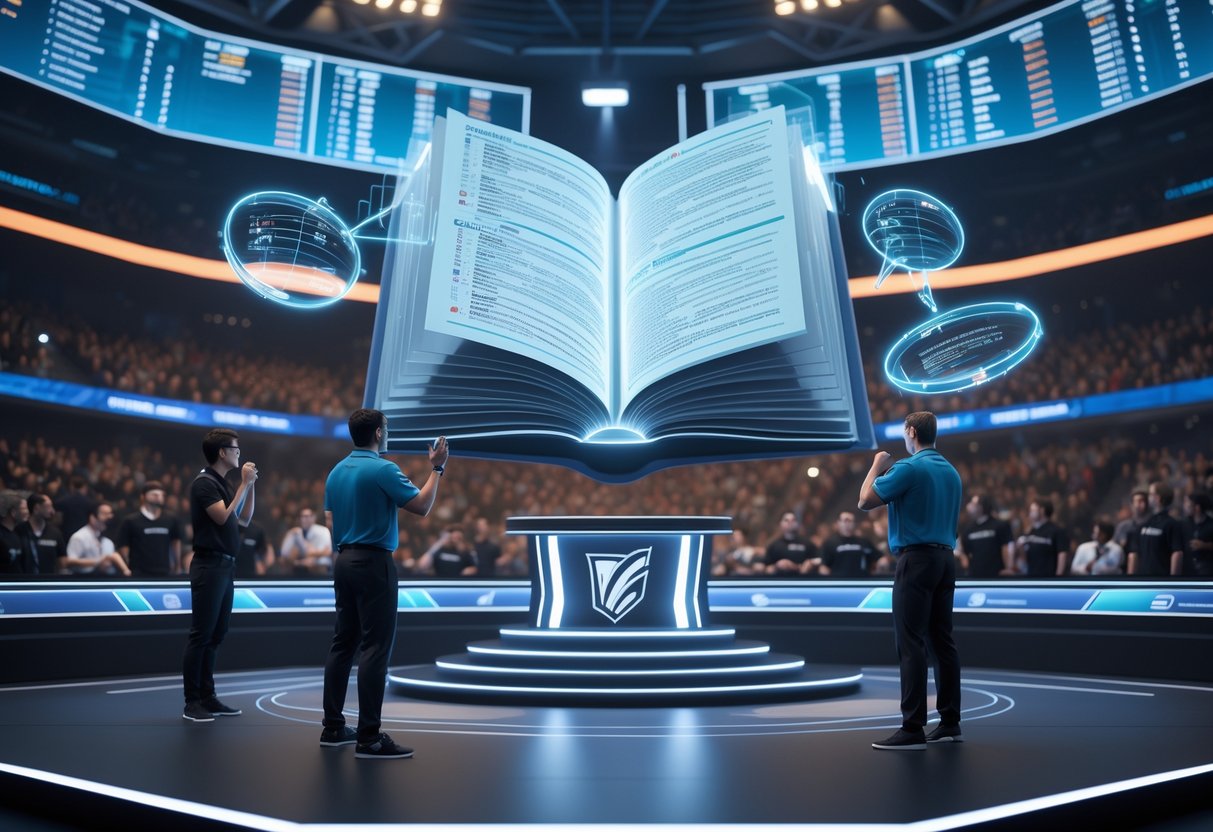
Oregon found a way to use NCAA timing rules to their advantage, showing just how complicated college football regulations can get. The situation revealed a real gap between what the rules intend and how teams actually use them.
Relevant NCAA Timekeeping Rules
NCAA timekeeping rules spell out when the clock stops and starts. Usually, the clock stops for penalties until officials spot the ball and signal play to resume.
The basics:
- Clock stops for timeouts and penalties
- Officials restart the clock after enforcing a penalty
- No automatic time reset for most fouls
- Special rules in the last two minutes
The committee built these timing standards to keep the game moving. They probably didn’t expect coaches to use penalties to drain the clock.
Most penalties just change field position, not the clock. But the 12-men substitution foul created a weird loophole that actually helped the team committing it.
12-Men on the Field Explanation
The 12-men on the field penalty happens when a team has too many players during a play. Oregon purposely sent an extra defender out there with 10 seconds left.
What happens:
- Offense gets five yards
- Play counts, time runs off
- No automatic clock reset under old rules
- It’s a live-ball foul
Oregon’s incomplete pass burned four seconds, even though they got penalized. Ohio State got five yards but lost valuable time.
This isn’t like dead-ball fouls, which might let officials adjust the clock. NCAA officials said they followed the rules as written.
Coach Dan Lanning admitted Oregon practiced this exact scenario. His staff found the loophole by digging into the rulebook.
Exploiting Penalty Timing
Oregon traded five yards for precious seconds. That tiny penalty meant more than giving up a shot at a game-winning field goal.
The strategy:
- Take a penalty on purpose
- Focus on clock, not field position
- Use rule gaps to win
- It’s legal, but is it really good sportsmanship?
The NCAA quickly closed this loophole. Now, officials reset the clock to pre-snap time for late-game substitution fouls.
Teams now hire rules analysts to find these little edges. Oregon’s move showed just how much preparation goes into high-level college football.
This whole episode made it clear: teams will do whatever the rules allow if it means winning.
State-Level Implications and Responses

The bracket reset controversy has led to a patchwork of rules across different states. Some states set strict standards, while others let tournament organizers do their own thing.
Impact on State Sports Policy
A handful of states now include esports in their official sports programs. That move directly impacts how bracket resets work in state competitions.
California set the pace with mandatory bracket reset rules for all state high school esports leagues. They require double elimination finals to use resets, so every tournament has the same rules.
Texas does it differently. Each school district picks its own tournament format. Some use resets, some don’t.
Florida updated its rules so state championships must announce their bracket reset policy before registration. Teams know what they’re signing up for.
| State | Bracket Reset Policy | Implementation |
|---|---|---|
| California | Mandatory for double elimination | All state competitions |
| Texas | Optional | District choice |
| Florida | Must be announced | Pre-registration |
Other states are watching and waiting. As esports grows, we’ll probably see more states set clear rules.
Public Sentiment Across States
Players’ feelings depend a lot on what their state does. States with clear policies have fewer arguments.
West Coast players usually support bracket resets. They see them as necessary for fairness. Most tournaments there use resets.
Midwest players are split. Some love the extra chance, others just get confused. Attendance hasn’t really changed.
East Coast players lean toward single elimination. They like quick tournaments, but most accept resets if organizers explain the system.
Southern states seem most resistant to bracket resets. The traditional sports mindset runs deep, so straightforward brackets are the norm.
Tournament organizers say that when they explain the system early, complaints drop. States with education programmes see better acceptance everywhere.
Reactions from Coaches and Players
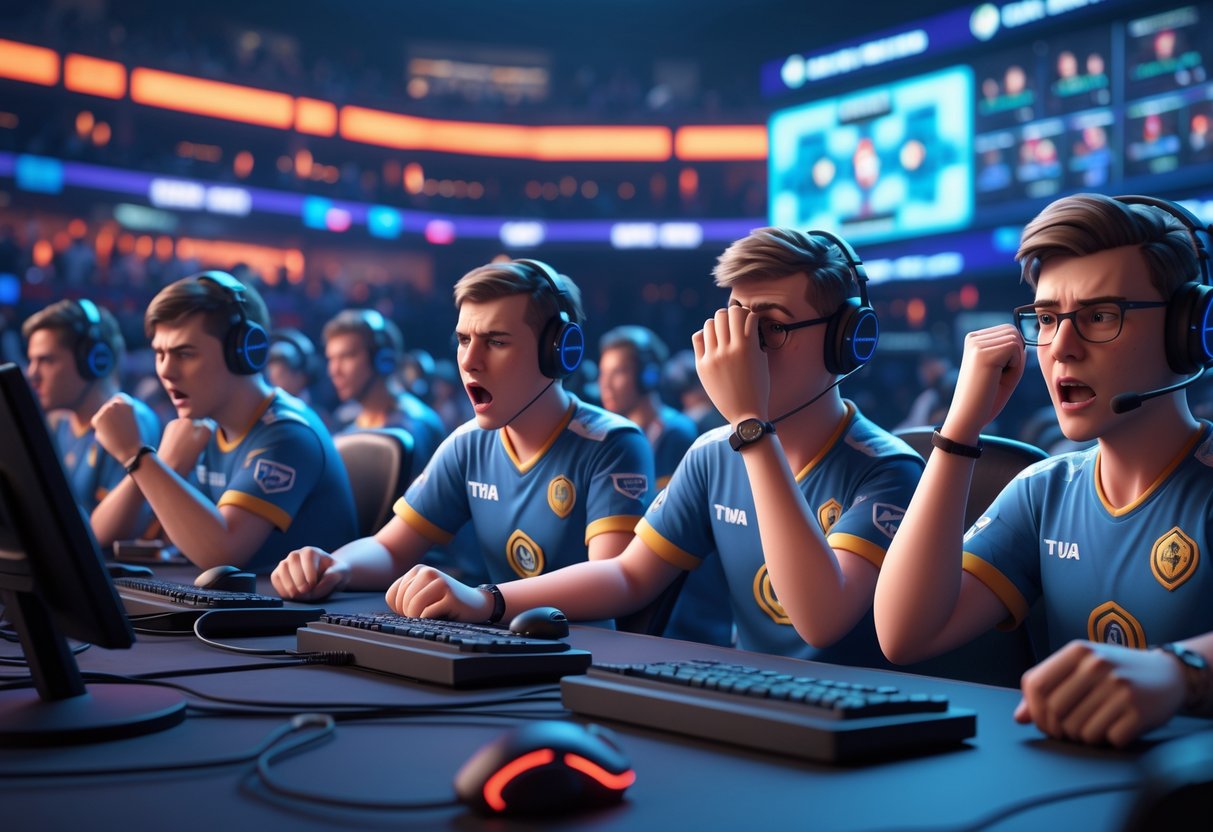
College football coaches and players haven’t held back about the bracket reset controversy. Some big names have spoken out, either criticizing or backing the committee’s decisions.
Dan Lanning’s Statements
Oregon head coach Dan Lanning stood by his team’s top seed. He said they earned it with an undefeated run through a tough conference.
Lanning pointed out that Oregon played one of the hardest schedules in college football. The Ducks took on several ranked opponents.
“We didn’t back down from anyone,” Lanning told reporters. His team scheduled tough non-conference games right from the start.
He also pushed back at critics who doubted the Pac-12 deserved the top spot. Lanning listed wins over teams that made the playoff.
Ohio State’s Response
Ohio State coaching staff didn’t hide their disappointment with the seeding. They felt their record deserved a better spot in the bracket.
Coach Ryan Day talked up his team’s strength of schedule. The Buckeyes beat multiple teams that made the playoffs.
Players took to social media to vent. Some posted that they felt disrespected by the committee.
The athletic director backed the coaches and players. He called the seeding “puzzling” after Ohio State’s wins over top teams.
Athlete Perspectives
Student-athletes from several programs shared their thoughts online. Many said they didn’t understand the committee’s criteria.
Players from teams left out of the playoff were especially vocal. They questioned why some teams got in over others with better records.
A lot of players talked about the emotional toll. They’d trained all year with the hope of making the playoffs.
Some mentioned how the controversy hurt recruiting and team morale. It made them question the system’s fairness.
Several players called for a change in the selection process. They want more transparency in how decisions get made.
NCAA Review and Potential Rule Changes
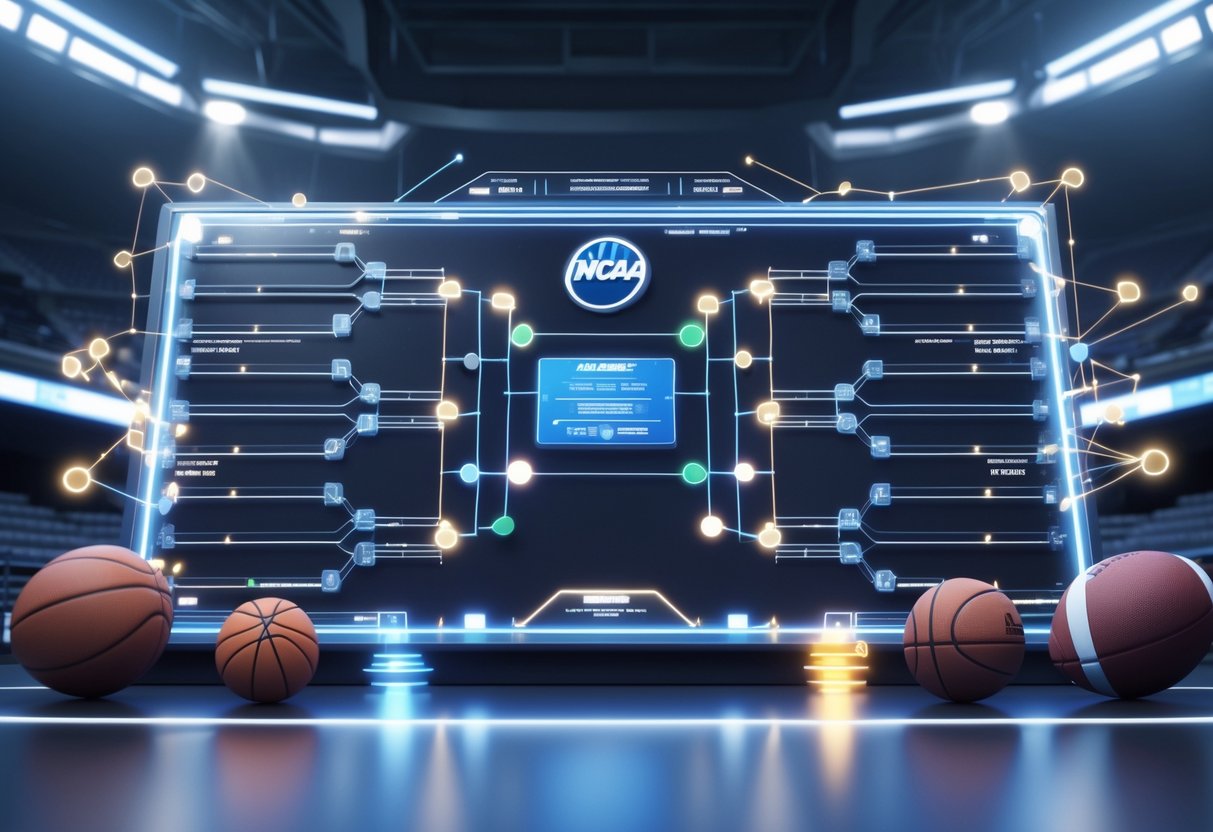
The NCAA jumped into action after the bracket reset controversy. Officials immediately put clock restart rules and midseason review processes at the top of their to-do list.
Initial NCAA Response
The NCAA board of directors reacted quickly after the bracket reset mess. They approved nine legislative proposals to overhaul how officials handle clock situations.
Key changes:
- Possession reviews in the final two minutes
- More replay authority for officials
- New training requirements for referees
They scrapped 153 outdated rules from the official rulebook. That cleared the way for more targeted guidelines about bracket resets and clock management.
Steve Shaw, the National Coordinator of Officials, took charge of the response. He and his team worked closely with the Football Rules Committee to dig into the controversy’s root causes.
College football really needed clearer standards. The old rules left too much up to interpretation, especially in high-stakes moments.
Proposals for Adjusting Clock Restarts
The NCAA’s review process led to new clock restart protocols. Now, officials can stop play to double-check timing procedures during bracket reset situations.
The new proposals look like this:
| Situation | Old Rule | New Proposal |
|---|---|---|
| Bracket reset in final 2 minutes | Officials’ discretion | Mandatory review |
| Clock restart timing | No specific protocol | 10-second verification window |
| Team timeout usage | Standard rules apply | Protected timeout for technical issues |
Officials now have to complete bracket reset simulations as part of their training. Each crew runs through these scenarios every month during the season.
The rules committee wants automatic reviews for any clock stoppage lasting over 30 seconds. That should cut down on confusion about when play starts again.
Teams get to keep their timeouts during technical bracket resets. The NCAA finally admitted that equipment failures shouldn’t cost teams strategically.
Midseason Review Process
The NCAA set up ongoing monitoring for bracket reset cases all season long. Officials have to submit detailed reports within 24 hours if any clock management controversy pops up.
A three-person review panel looks at each case. The panel includes a current referee, a rules committee member, and a conference supervisor.
Monthly assessments track patterns in bracket reset issues. The NCAA uses that data to tweak training and rule interpretations.
Conference supervisors now get updated guidance every month. That keeps things consistent across different regions and competition levels.
The midseason process lets officials get rule clarifications right away. They don’t have to wait until the offseason to fix new problems.
Real-time feedback helps avoid repeat mistakes. If an official messes up a bracket reset, they get extra training within a week.
Comparing College Football and Other Sports
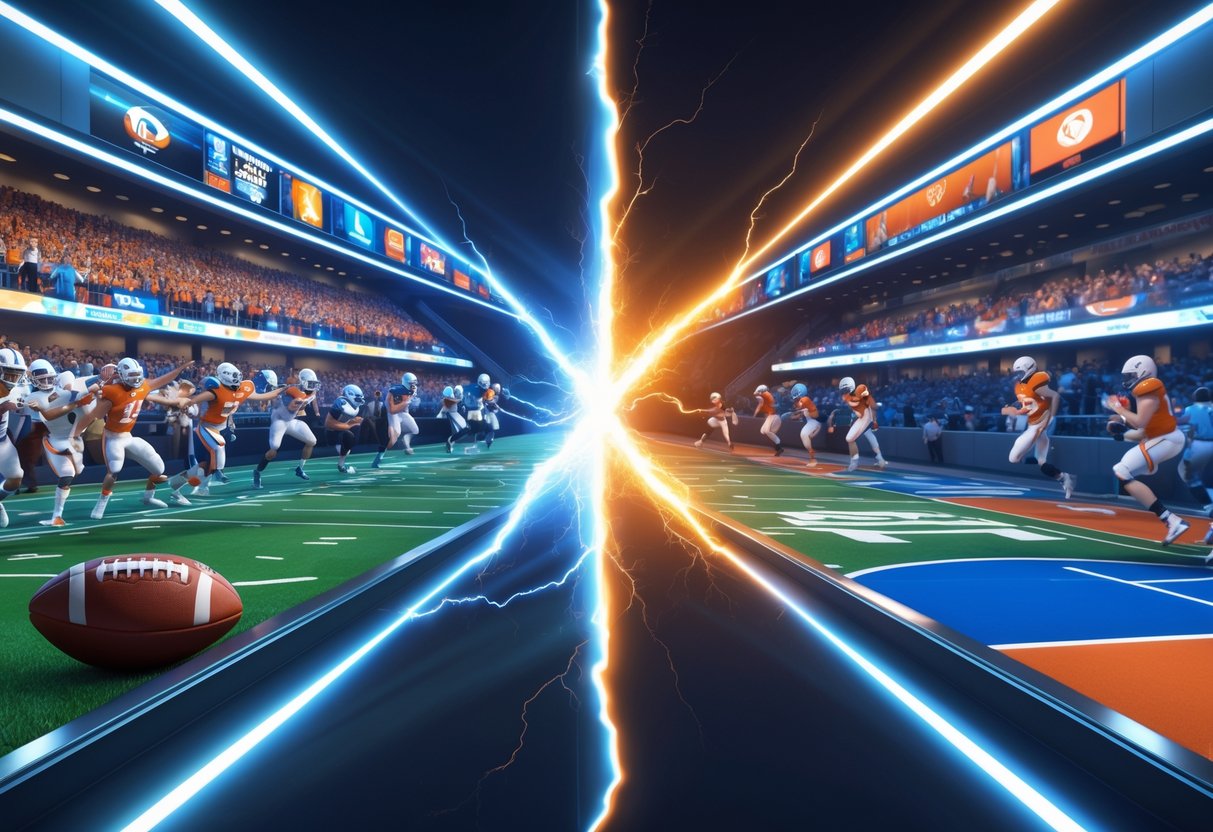
College football’s bracket debates revolve around selection, not mid-tournament resets. Esports and basketball tournaments use bracket resets as part of the game, but college football’s drama is all about which teams get the playoff nod in the first place.
Bracket Resets in Esports and Basketball
Esports tournaments build bracket resets into their rules. In fighting games, if someone from the losers’ bracket makes it to the grand final, they have to beat the winners’ bracket champ twice to win.
That’s because the winners’ bracket finalist hasn’t lost yet. The reset puts both players on even ground for the final match.
Basketball tournaments almost never reset brackets in the middle. March Madness just sticks to single elimination, no matter what kind of upset or drama happens.
Pro esports examples:
- Street Fighter tournaments: Grand finals can reset automatically
- Rocket League championships: Best-of-seven with possible resets
- Call of Duty leagues: Double elimination with reset rules
These resets happen live, right in the thick of competition. Players and fans expect them—they’re baked into the structure.
Unique Aspects in College Football
College football’s “bracket reset” controversy isn’t about in-game resets. It’s about selection committee decisions and format changes before the tournament starts.
The debate is really about how the committee picks teams and overhauling formats years in advance. The 2026 playoff expansion talks are more administrative resets than anything else.
Key differences:
- No mid-tournament bracket changes
- All the controversy happens during team selection
- Format debates start way before the games
- Conference politics always play a role
The SEC wants to change how teams get picked, not how brackets work during the games.
That’s what makes college football stand out. Other sports settle things on the field with clear bracket rules and resets.
Historical Cases of Bracket Controversies
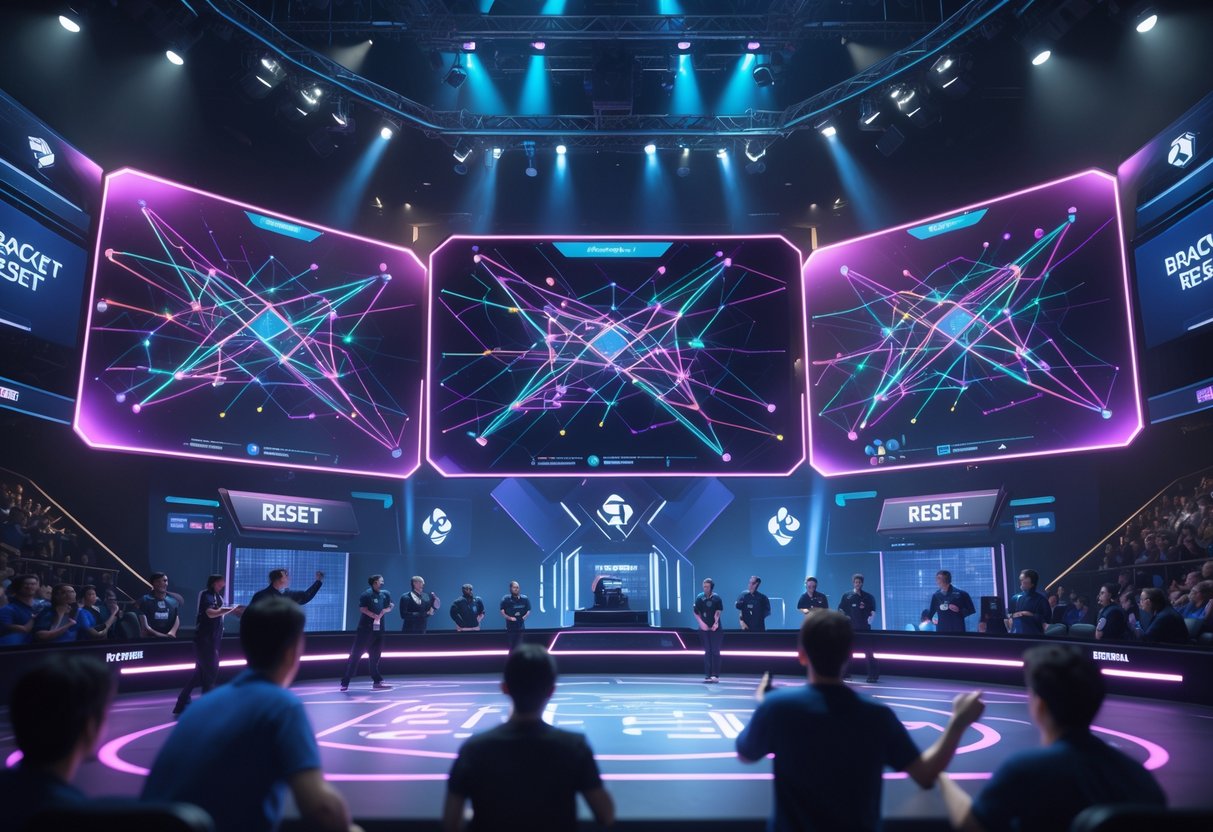
Bracket manipulation has sparked fierce debates across sports and gaming for years. From college football playoff decisions that split fan bases to gaming tournament scandals that hurt pro reputations, these controversies show just how much bracket calls matter.
Notable Past College Football Incidents
The 2014 College Football Playoff committee stirred up a storm by picking Ohio State over Baylor and TCU for the last playoff spot. Both Big 12 teams had better regular season records, but the committee liked Ohio State’s conference championship.
Baylor fans insisted their win over TCU should’ve clinched it. TCU supporters pointed to their higher ranking before the final week.
Things got even messier when Ohio State won the whole championship. Critics started asking whether the “best” team or the “most deserving” team should get in.
Impact:
- The committee started explaining their choices more thoroughly
- Strength of schedule started to matter more
- Conference championships carried more weight
A similar mess happened in 2017 when Alabama got picked despite not winning their division. The committee picked them over two-loss conference champs, which set off another round of fan outrage.
Similar Controversies in Different States
Gaming tournaments have had their own bracket manipulation scandals. The infamous MLG DC 2010 incident had top players Mew2King and ADHD allegedly splitting prize money, which made people question the competition’s integrity.
State-level gaming events see players from the same area team up to get ahead. That gives certain regions an unfair edge.
Common patterns:
- Friends helping each other advance
- Regional alliances at big tournaments
- Organisers separating players by location
The 2019 Captain Zack scandal crossed state lines. His blackmail tactics at Prime Saga and MomoCon led to bans from multiple tournaments.
These examples prove bracket controversies aren’t just a sports thing. Any big-stakes competition can face similar headaches.
Media Coverage Over Time
Early bracket controversies barely made the news. Maybe a local paper would cover a college football dispute, but national coverage was rare. Gaming incidents stayed out of sight except in niche forums.
Social media changed all that. The 2014 playoff debate exploded on Twitter and Facebook. Fans posted stats and charts that went viral fast.
Modern coverage:
- Instant reactions on all platforms
- Fans creating content to challenge decisions
- 24-hour news cycles that keep controversies alive
Now, even gaming scandals get covered by ESPN and other major sports outlets. The Captain Zack story brought esports integrity issues to the mainstream.
Controversies feel more intense now, but at least they’re more transparent. Organisers have to answer to global audiences, not just a handful of locals.
Influence on Players, Fans, and Stakeholders
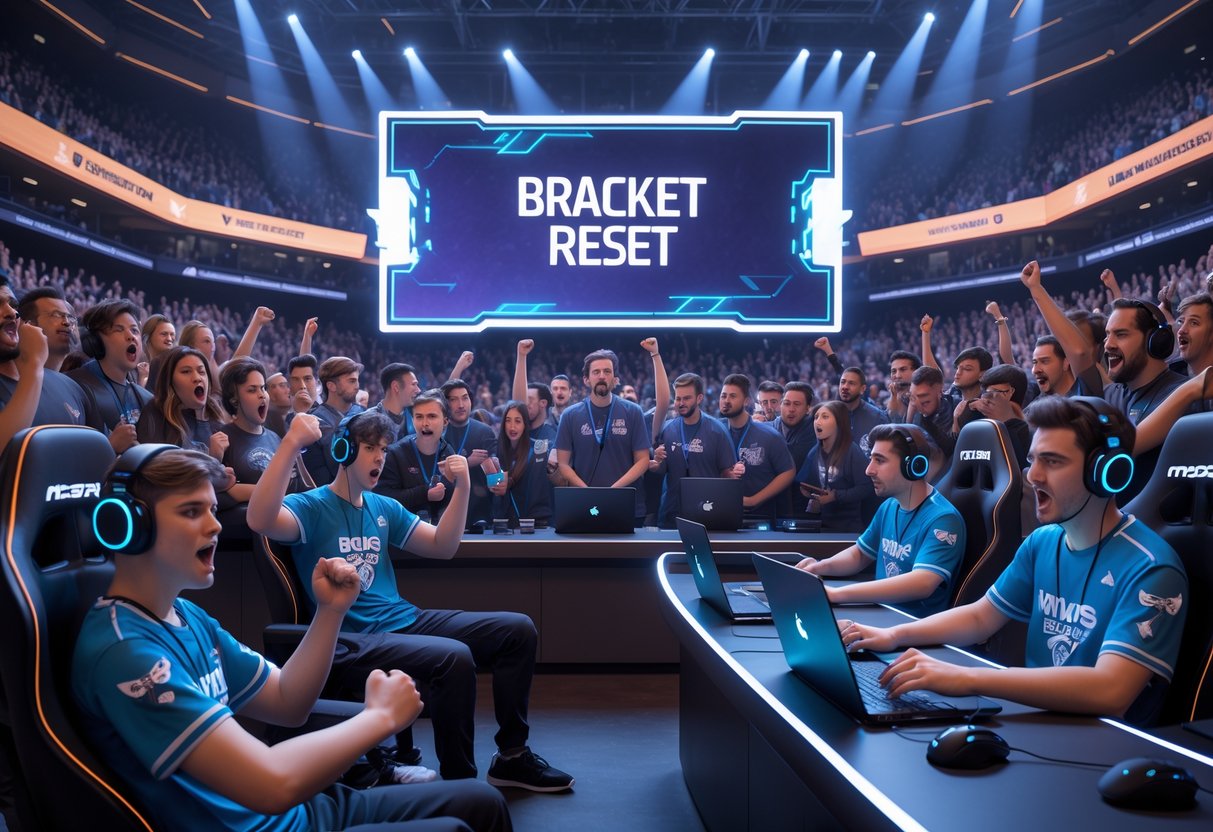
Bracket reset controversies send shockwaves way beyond the tournament. They shape how fans interact online and can shake trust in entire competitive programs.
Fan Reactions and Social Media
Social media turns into a war zone when bracket resets spark debate. Fans rush to Twitter and Discord to argue about what’s fair.
The split between fan bases makes things even more heated. Some communities want bracket resets, others hate them.
Typical fan reactions:
- Twitter threads picking apart rules
- Reddit posts demanding format changes
- Twitch chat spam during live controversies
- Discord arguments that drag on for days
It’s not just background noise. Tournament organisers track social sentiment closely because negative fan reactions can hurt future viewership.
Some fans just stop watching if they think the format’s unfair. Others double down, making content to defend or attack the system.
Social media spreads these controversies at lightning speed. One bracket reset call can trend in hours, reaching people who didn’t even watch the event.
Recruitment and Programme Trust
Bracket reset drama hits player trust hard. If players sense the rules are inconsistent, they’ll skip certain tournaments.
College football esports programmes find this especially tough. Students wonder if it’s worth investing their time when the structure feels random.
Trust issues show up as:
- Fewer sign-ups for upcoming tournaments
- Players demanding rule explanations before joining
- Teams boycotting events with sketchy formats
- Less sponsor interest after negative publicity
Recruitment drops when new players see veterans complaining about unfair formats. They start to assume all tournaments are like that.
Programme directors end up spending a ton of energy rebuilding trust. They host Q&A sessions and rewrite rules to keep things fair.
For new esports titles, early format controversies can ruin a scene before it even gets started.
Some programmes now put out detailed bracket reset policies before any tournament begins. That kind of transparency helps keep players confident, even when things get messy.
Long-Term Effects and Future Projections
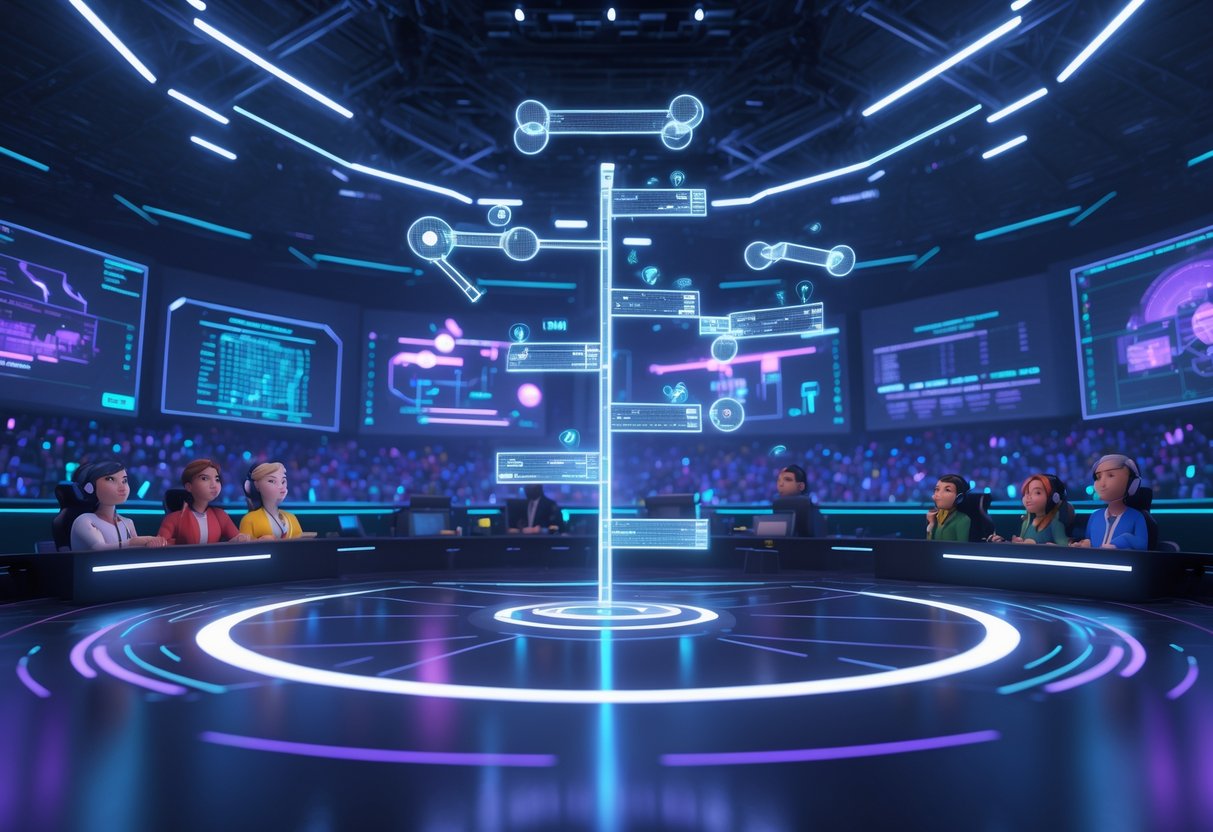
The bracket reset mess is forcing organisers and teams to rethink how competitive structures should work. New strategies are popping up, but so are fresh loopholes.
Evolving Bracket Strategies
Organisers are moving away from the old double-elimination setups that caused so much trouble. A lot of UK esports events now use modified Swiss systems or group stage hybrids to dodge the awkward situation where a winners bracket champ can lose twice.
The FGC community is trying out extended sets instead of full resets. If a losers bracket winner takes the first match, they go to a best-of-seven instead of two separate best-of-fives. It keeps things balanced and saves time.
Round-robin preliminaries are becoming the new standard for big events. Teams face everyone in their group before knockouts start. That helps prevent early upsets that used to send favorites to losers brackets.
Organisers are also using adaptive bracket sizing. Instead of always running 64-player tournaments, they scale brackets based on registration. Smaller brackets mean fewer reset headaches and more fairness.
Potential for New Loopholes
Creative teams are already poking holes in these new systems. Some throw group stage matches on purpose to get easier matchups in knockouts.
Other players tank early games to drop into losers brackets and face weaker opponents. This sandbagging can mess with the whole elimination system.
Alliances can cause trouble in round-robins. Teams sometimes agree to throw matches that help both sides advance.
The biggest new problem is bracket prediction markets. When fans can bet on bracket outcomes, players feel pressure to influence results beyond just playing their best. Organisers are scrambling to keep up with these outside influences.
Coaching communication during matches is another grey area. Teams use timeouts and signals in ways the rules never really covered.
What States and Teams Can Expect Next
College esports programs should get ready for standardized bracket formats across university competitions. The National Association of Collegiate Esports wants to roll out unified rules that cut out venue-specific quirks.
State-level tournaments will probably try out the hybrid formats that premier leagues have been testing. Local events just don’t have the budget or time for the broadcast headaches that come with traditional resets, so they’ll likely stick with simpler elimination systems.
Teams should plan for longer tournament days. New formats usually mean more hours, which can mess with travel and accommodation plans for multi-state competitions.
Prize pool distributions are moving away from the old winner-takes-all approach. More events now flatten payouts to lower the drama around tricky bracket decisions.
We’ll probably see automated bracket management as the norm soon. Software helps cut down on human error during seeding and blocks some of the manipulation that manual systems allow.
Lessons for Organisers and Governing Bodies
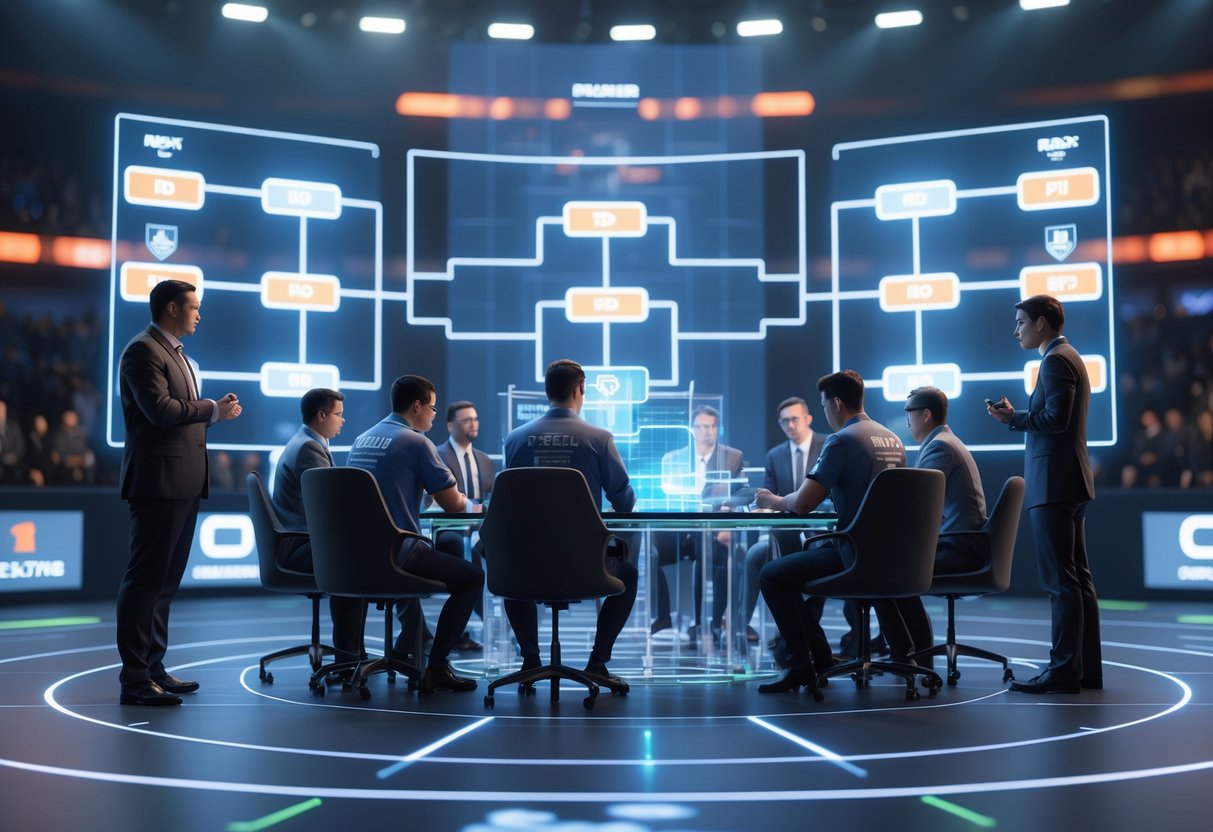
Tournament organisers and sport governing bodies really need to set clear policies on bracket resets before any drama hits their events. When you lay out fair rules and communicate them openly, you keep things honest and help players know what to expect.
Best Practice Recommendations
Write detailed bracket reset policies before your tournament starts. Spell out exactly when resets happen, how you’ll announce them, and what changes afterwards.
Your rulebook should lay out double-elimination procedures in plain language. Toss in a few examples of bracket reset scenarios so players aren’t left guessing.
Share bracket structures up front during registration. Players want to know if they’re signing up for single or double elimination. That way, nobody gets blindsided during important matches.
Think about these key policy pieces:
- Clear reset triggers and conditions
- Time limits between reset matches
- Steps for equipment or technical issues
- Player substitution rules for resets
Train your tournament staff on how to handle resets. Officials should be able to explain decisions quickly and stick to the script when resets come up.
Test your bracket software before the event goes live. Plenty of headaches start with tech errors, not bad intentions.
Balancing Fair Play and Strategy
Double elimination adds fairness but also brings extra complexity, which can throw off newcomers. Winners bracket teams should still get some kind of edge after dropping the grand final.
A lot of organisers give upper bracket winners a one-game lead in the reset match. That rewards their earlier run while keeping things balanced.
Time management gets tricky during resets. Long tournaments can wear out players and annoy viewers who expect things to end on time.
Shorter match formats for reset games might help. Best-of-five instead of best-of-seven keeps things tense and avoids dragging out the finals.
Player welfare is a big deal in extended bracket situations. When players get tired, their performance drops and the whole event can look bad.
Make sure to schedule breaks between reset matches. Pros need a little time to clear their heads and stay sharp.
Frequently Asked Questions
People in competitive gaming circles love to debate bracket resets—whether it’s about fairness, match length, or just how the format affects the viewing experience.
What is a bracket reset in competitive gaming and why is it sometimes a contentious topic?
A bracket reset happens in double-elimination tournaments when the upper bracket team loses to the lower bracket team in the grand final. That loss forces a second grand final match, since both teams now have one loss.
The controversy comes from perceived advantages. The upper bracket team basically gets a “free” loss and still holds their spot. A lot of fans think this creates an unfair setup in the finals.
Some viewers find bracket resets a bit of a letdown. They see the upper bracket team as too advantaged, so the outcome feels obvious before the match even starts.
How can a bracket reset impact the duration and scheduling of a tournament?
Bracket resets can drag out tournament schedules by hours. What should be a single grand final can turn into two full matches or series.
Organisers have to plan for this. They book venues for longer blocks and add buffer time to broadcasts. This bumps up operational costs.
Viewers might tune out during long finals. If matches run late into the night, especially for global audiences in other time zones, viewership can drop.
What are the arguments for and against implementing bracket resets in finals?
Supporters say bracket resets protect competitive integrity. Teams that go undefeated in the upper bracket should get the same second chance that lower bracket teams had.
Critics say resets make for boring finals. They claim upper bracket teams end up with big mental and strategic advantages, so their win feels almost guaranteed.
Some people suggest alternatives, like giving the upper bracket team a one-game head start or tweaking the scoring, instead of doing a full reset.
Can you explain the difference between single-elimination and double-elimination tournaments regarding bracket resets?
Single-elimination tournaments never do bracket resets. If you lose once, you’re out—there’s no way to reset the bracket in the final.
Double-elimination splits teams into winners and losers brackets. If you lose once, you drop to the losers bracket, which sets up the possibility for a bracket reset.
The reset only happens if the undefeated upper bracket team loses their first match in the grand final. At that point, both finalists have one loss each.
Why do some fans and competitors view bracket resets as unfair or unsatisfying in competition outcomes?
A lot of fans think bracket resets make the outcome feel predetermined. The upper bracket team’s advantages can make their win seem inevitable, not thrilling.
Lower bracket teams feel the pressure. They have to win twice, while their opponents just need one victory—honestly, it can feel impossible.
This format can take the shine off those championship moments. Instead of one big, decisive win, the victory after a reset might seem hollow, especially if it felt unwinnable from the start.
How do organisers typically address concerns regarding bracket resets in competitive events?
Some tournaments actually tweak the double-elimination format. For example, they might give upper bracket teams a one-map or one-game advantage, so there’s no need for a full bracket reset.
Others try out different scoring systems. Sometimes, points-based formats or shorter series help balance things out without going for a complete reset.
Plenty of organisers just stick to tradition, though. They keep the classic double-elimination rules, even if fans grumble, because they feel fairness matters more than entertainment.

